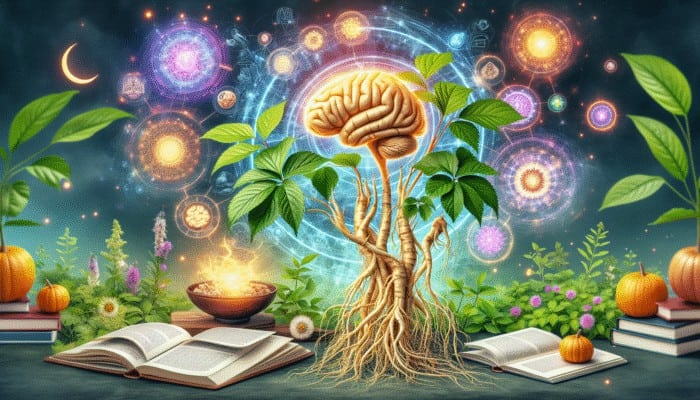Boost Your Mental Clarity with Powerful Herbs
Maximize Your Cognitive Potential with Ginseng

Herbs to Reduce Mental Fatigue: Ginseng has established itself as a remarkable herb renowned for its incredible capacity to enhance mental performance and combat fatigue. As an adaptogenic herb, particularly the Panax variant, it has been traditionally consumed in teas and supplements across various cultures, providing a natural remedy to improve cognitive function. In the UK, ginseng is easily accessible in health shops, frequently marketed as a natural energy enhancer. Scientific research indicates that ginseng may boost cognitive function by promoting brain activity and enhancing memory retention, positioning it as an excellent choice for those looking to achieve mental clarity and focus.
Incorporating ginseng into your daily routine is quite simple and effective. Many people enjoy ginseng tea as a refreshing morning beverage, while others prefer the convenience of capsules. Its naturally slightly bitter taste can be balanced with honey or lemon, making it both beneficial and pleasurable to consume. Ginseng is especially recommended for individuals facing chronic fatigue or those aiming to enhance their productivity and concentration throughout the day.
The advantages of ginseng are particularly beneficial for students and professionals during periods of elevated stress, such as exams or major projects. Regular intake has been linked to improved concentration and focus, making it an ideal ally for anyone grappling with mental challenges. Given the fast-paced lifestyle prevalent in the UK, ginseng serves as a natural remedy to combat mental fatigue and maintain a sharp, alert mind.
Enhance Your Memory and Concentration with Rosemary
Celebrated for its aromatic properties, rosemary not only elevates culinary dishes but also provides significant cognitive advantages. This versatile herb has been scientifically shown to improve memory and concentration, making it a favored choice for individuals seeking to boost their mental clarity. Research indicates that rosemary contains compounds that may increase blood flow to the brain, thereby enhancing cognitive function and potentially alleviating mental fatigue.
Incorporating rosemary into your meals is not only easy but also delicious. Fresh rosemary can be sprinkled onto a variety of dishes, ranging from roasted meats to hearty stews, significantly enhancing flavor while promoting mental wellness. Additionally, rosemary tea, crafted from the aromatic leaves of the herb, offers a fragrant and stimulating drink that can foster mental alertness and clarity.
For alternative applications, rosemary essential oil can be utilized in aromatherapy practices. Inhaling the scent of rosemary has been associated with heightened focus and improved memory retention, making it an excellent companion for study sessions or prolonged work hours. With its deep-rooted significance in various cultures, including British traditions, rosemary stands out as an exceptional herb for minimizing mental fatigue and elevating mental clarity.
Refresh Your Mind with Peppermint
Peppermint is more than just a refreshing herb; its invigorating properties can greatly enhance alertness and reduce mental fatigue. This herb contains menthol, which has been proven to improve cognitive performance, alleviate stress, and enhance focus. The aroma of peppermint is renowned for stimulating the senses, fostering a sense of wakefulness, making it an ideal addition to workspaces or study environments.
Peppermint tea is a favored choice among many in the UK, offering a calming yet energizing beverage. Its preparation is simple—just steep fresh or dried peppermint leaves in hot water for a delightful infusion that can be enjoyed at any time of the day. Furthermore, peppermint essential oil can be utilized in diffusers or applied topically (with dilution) to revitalize the mind and diminish feelings of fatigue.
In high-pressure jobs or intensive study situations, peppermint can provide a refreshing mental boost. A quick inhalation of peppermint oil or sipping peppermint tea can offer the necessary energy to tackle demanding tasks. Overall, whether used in cooking, enjoyed as tea, or through aromatherapy, peppermint is a versatile herb that provides substantial support in combating mental fatigue.
Smart Strategies to Integrate Herbs into Your Everyday Diet

Discover the Advantages of Herbal Teas
Herbal teas represent one of the simplest and most enjoyable methods to consume beneficial herbs, such as ginseng and peppermint. The process of steeping herbs in hot water not only releases their unique flavors but also extracts their potent health benefits. In the UK, health-conscious individuals are increasingly adopting herbal teas as a daily ritual, especially as a refreshing alternative to traditional caffeinated drinks.
Preparing herbal teas is straightforward and can be customized to suit personal flavor preferences. For instance, a delightful combination of ginseng and peppermint tea provides both energy and relaxation. Infusing fresh herbs into boiling water for several minutes allows their flavors and health-promoting compounds to meld beautifully. Adding a dash of honey or lemon can enhance the flavor while complementing the health benefits.
Consuming herbal teas at various times throughout the day promotes hydration and serves as a moment of mindfulness, encouraging individuals to pause and rejuvenate. Whether enjoyed in the morning to kick-start the day or in the afternoon for a refreshing boost, herbal teas are an excellent way to incorporate herbs to reduce mental fatigue into daily life.
Elevate Your Dishes by Cooking with Herbs
Integrating herbs to reduce mental fatigue into everyday meals is a delightful way to enhance both flavor and health benefits. Herbs like rosemary and ginseng can turn ordinary dishes into culinary masterpieces while providing essential nutrients that support mental clarity and focus. Cooking with herbs not only amplifies taste but also infuses meals with beneficial compounds that promote cognitive function.
For example, rosemary is incredibly versatile and can be added to a wide array of dishes—from roasted vegetables to grilled meats. Its distinctive flavor complements potatoes exceptionally well, and its health benefits make it a wonderful addition to any meal. Ginseng, while less commonly used in cooking, can be integrated into stir-fries or soups, imparting a unique flavor alongside its cognitive-enhancing properties.
In the UK, more restaurants are incorporating fresh herbs into their menus, emphasizing their potential to elevate dishes and support mental well-being. By intentionally selecting ingredients rich in herbs to reduce mental fatigue, home cooks can create meals that nourish both body and mind. Additionally, engaging in the cooking process can serve as a therapeutic activity, helping to alleviate stress, a common contributor to mental fatigue.
Convenient Herbal Supplements to Enhance Mental Clarity

For those seeking a convenient way to ensure adequate intake of beneficial herbs, herbal supplements present an effective option. In the fast-paced lifestyle of the UK, where time is often limited, supplements can provide a straightforward solution to integrate herbs that reduce mental fatigue into daily life. Ginseng, rosemary, and peppermint are readily available in capsule or tablet form, enabling individuals to reap their benefits without elaborate preparation.
Choosing high-quality supplements is essential for maximizing effectiveness. Reputable brands ensure that their products undergo rigorous testing for purity and potency, providing consumers with peace of mind. Additionally, herbal blends that combine multiple ingredients can enhance benefits, allowing for a synergistic effect. For instance, a supplement containing ginseng, rosemary, and peppermint may work more effectively together than when taken alone.
While supplements can be advantageous, consulting with a healthcare provider before starting any new regimen is crucial. This ensures that the chosen supplements align well with individual health needs and do not interfere with existing medications. In summary, herbal supplements offer an accessible way to incorporate herbs to reduce mental fatigue into one’s routine, particularly for those who find it challenging to consume herbs through food or tea regularly.
Fresh Herb Salads: A Delicious Way to Nourish Your Mind
Integrating fresh herbs like basil and coriander into salads not only enhances flavor but also significantly boosts the nutritional value of meals. Salads serve as an excellent platform for creative combinations, and adding fresh herbs can transform a simple dish into a vibrant culinary experience. For those focused on mental clarity, salads enriched with herbs can serve as a delicious and healthful option to combat mental fatigue.
Fresh herbs are abundant in vitamins and antioxidants, essential for overall health and well-being. For instance, basil contains eugenol, recognized for its anti-inflammatory properties, while coriander is rich in vitamin K, which supports brain health. By incorporating a diverse array of herbs into salads, individuals can create a nutrient powerhouse that bolsters mental clarity and responsiveness.
In the UK, many local markets offer a wide variety of fresh herbs, making it easy to experiment with new flavors and textures. A simple salad featuring mixed greens, cherry tomatoes, sliced cucumber, and a generous handful of fresh herbs can act as a refreshing side or an energizing main dish. Dressed lightly with olive oil and lemon juice, these salads deliver a vibrant burst of flavor while providing essential nutrients that combat fatigue. Thus, fresh herb salads emerge as an appealing and effective way to incorporate herbs into your diet to reduce mental fatigue.
Scientific Evidence Endorsing the Use of Herbs for Mental Clarity
Research Studies Demonstrating the Benefits of Herbs
A multitude of clinical studies have substantiated the effectiveness of herbs in reducing mental fatigue and enhancing cognitive function. Research has indicated that herbs such as ginseng can significantly lower levels of mental fatigue while concurrently improving attention and memory. A notable study published in a reputable journal found that participants who consumed ginseng exhibited substantial improvements in cognitive performance compared to a placebo group.
The implications of these studies are profound, particularly for individuals experiencing chronic fatigue or those under intense mental stress, such as students and professionals. Many find that integrating ginseng into their daily routines leads to sustained focus and improved performance throughout demanding tasks.
Moreover, clinical trials involving rosemary have demonstrated potential in supporting cognitive function. Participants who inhaled rosemary aroma during memory tasks showed enhanced recall and concentration levels. Such findings suggest that the sensory aspects of herbs play a crucial role in mental clarity, making them invaluable tools for anyone striving to enhance their cognitive abilities.
The growing body of evidence highlights the importance of incorporating natural remedies, such as herbs. As more individuals in the UK turn towards holistic health approaches, these studies provide scientific support for the use of herbal solutions in combating mental fatigue and improving cognitive performance.
The Historical Context of Herbs for Cognitive Enhancement
The practice of using herbs to reduce mental fatigue is deeply embedded in history; these natural remedies have been utilized for centuries across various cultures. Historical records reveal that ancient civilizations, including the Greeks and Romans, relied on herbs such as ginseng and rosemary for their believed cognitive-enhancing properties.
In ancient Chinese medicine, ginseng was cherished for its ability to invigorate the mind and body, providing essential strength and stamina. Rosemary has been used since antiquity, often linked to memory enhancement. It was commonly worn as a garland by students in ancient times, believed to enhance mental acuity during examinations.
The historical application of these herbs establishes a strong basis for their ongoing relevance in contemporary society. As modern science begins to validate these time-honored practices, individuals are rediscovering the benefits of herbs that have withstood the test of time. This rich historical context not only lends credibility to their use but also inspires modern consumers to delve into the wealth of knowledge surrounding herbal remedies.
By understanding the longstanding traditions associated with herbs to reduce mental fatigue, individuals can appreciate the depth of wisdom that informs their usage today. Such awareness fosters a deeper connection to the natural world and underscores the enduring value of these powerful plants.
Modern Research Supporting Herbal Benefits
Recent research continues to corroborate the use of herbs to alleviate mental fatigue and promote cognitive health benefits. Numerous studies have explored the chemical composition of herbs such as rosemary and peppermint, revealing their potential to enhance various facets of cognitive function. For instance, modern studies have identified key compounds in rosemary that may offer neuroprotective effects, safeguarding against cognitive decline and improving memory.
Additionally, peppermint has been the focus of several studies examining its effects on alertness and mental fatigue. In controlled environments, participants exposed to peppermint aroma performed better on cognitive tasks, implying that the herb's invigorating properties extend beyond mere flavor. This understanding aligns with historical uses of peppermint as a revitalizing herb, reinforcing its place in contemporary wellness.
As researchers delve deeper into the mechanisms by which these herbs operate, the field of herbal medicine continues to evolve. Integrating traditional knowledge with cutting-edge science presents exciting opportunities for individuals seeking natural solutions to enhance mental clarity and reduce fatigue.
The accumulation of modern research enriches the discourse surrounding herbs that can help reduce mental fatigue, equipping consumers with informed choices. As the scientific community further investigates these powerful plants, the benefits they offer will undoubtedly become more evident, solidifying their role in holistic health practices.
Insights from Comprehensive Meta-Analyses on Herbal Efficacy
Comprehensive meta-analyses of various studies have consistently affirmed the positive effects of herbs on reducing mental fatigue, thereby enhancing mental clarity and focus. These analyses aggregate data from numerous research projects to provide a clearer understanding of the overall effectiveness of specific herbs. For instance, extensive reviews have underscored the cognitive benefits of ginkgo biloba, a herb frequently mentioned alongside ginseng and rosemary.
Through these meta-analyses, researchers have established that consistent use of ginkgo biloba correlates with improved memory and cognitive function in older adults, suggesting its potential as a preventive measure against age-related mental fatigue. These comprehensive reviews not only validate individual studies but also highlight trends and insights that could be overlooked in single research efforts.
The implications of these findings are particularly significant for individuals in the UK seeking natural solutions for mental fatigue. The evidence supporting the efficacy of various herbs provides a reassuring foundation for incorporating them into daily routines. For those dedicated to maintaining cognitive health, understanding the outcomes of these meta-analyses can inspire confidence in the potential benefits of these herbs.
As the body of evidence continues to expand, the importance of herbal remedies like ginkgo biloba, rosemary, and ginseng becomes increasingly recognized. This encourages broader acceptance and integration of herbal solutions into mainstream health practices, particularly in a society that values natural and holistic approaches to wellness.
Pharmacological Studies Supporting the Efficacy of Herbs
Research into the chemical components of herbs, including sage, aimed at reducing mental fatigue reveals their potential to enhance memory and alleviate cognitive decline. Pharmacological studies have identified various bioactive compounds within sage that may exert neuroprotective effects, thereby promoting overall brain health. Such findings highlight the significance of these herbs as more than mere culinary ingredients; they are formidable allies in the fight against mental fatigue.
Traditionally, sage has been utilized for its medicinal properties, and modern research corroborates its role in cognitive enhancement. Studies indicate that sage extract can enhance memory retention and cognitive performance in both healthy individuals and those with cognitive impairments. This positions sage as a powerful herb for anyone looking to boost mental clarity and focus.
As pharmacological research advances, our understanding of how these herbs interact with the brain becomes clearer. Insights garnered from these studies pave the way for further exploration of herbal remedies in mental health, emphasizing their potential role in supporting cognitive function.
The continued investigation into herbs that reduce mental fatigue through pharmacological studies reinforces their significance in both traditional and modern medicine. As more evidence emerges, individuals are empowered to embrace these natural solutions, thereby fostering enhanced cognitive health and improved mental resilience in their daily lives.
Recognizing Potential Side Effects and Precautions
Identifying Allergic Reactions to Herbs
While herbs to reduce mental fatigue offer numerous benefits, it is crucial to recognize that some individuals may experience allergic reactions to specific herbs. Allergies can vary widely among individuals, necessitating a cautious approach when introducing new herbs into one’s diet. For example, ginseng may provoke allergic reactions in certain individuals, leading to symptoms such as dermatitis, gastrointestinal distress, or respiratory issues.
To minimize the risk of adverse effects, it is advisable to start with small doses of new herbs and monitor for any signs of discomfort. This gradual approach allows individuals to assess their tolerance levels, thereby reducing the likelihood of experiencing unpleasant side effects. If any adverse reactions occur, it is essential to cease use and consult a healthcare professional for guidance.
Awareness of potential allergic reactions is particularly important for those with existing sensitivities or allergies. Individuals with known allergies to plants in the same family as the herb should exercise extra caution. Understanding personal health conditions and potential interactions can help ensure the safe incorporation of herbs to reduce mental fatigue into daily routines.
Ultimately, while the therapeutic properties of herbs are compelling, prioritizing safety is paramount. By remaining vigilant and informed, individuals can enjoy the advantages of these natural remedies without compromising their well-being.
Understanding Interactions with Medications
Herbs possess the potential to interact with various medications, making it essential for individuals to consult healthcare providers before starting any new herbal regimen. For instance, ginseng may affect blood sugar levels, potentially interfering with the effectiveness of diabetes medications. Similarly, rosemary has been known to interact with anticoagulants, potentially increasing the risk of bleeding.
Understanding these interactions is critical for ensuring the safe use of herbs to reduce mental fatigue. For individuals taking prescription medications, collaborating with a healthcare provider can help identify any possible contraindications. This partnership enables tailored recommendations, ensuring that herbal remedies can be safely integrated into treatment plans while minimizing any risk of adverse effects.
Additionally, it is advisable to inform healthcare providers about all supplements and herbs being consumed. This transparency fosters a comprehensive approach to health management, ensuring that all facets of an individual’s wellness are considered. In the UK, where holistic health approaches are gaining traction, this collaborative model can empower individuals to explore the benefits of herbs while remaining mindful of potential interactions.
By taking a proactive stance and seeking guidance, individuals can confidently navigate the landscape of herbal remedies, maximizing their benefits without compromising safety.
Avoiding Risks Associated with Overuse
Overuse of herbs like ginseng can lead to unwanted side effects, including insomnia, jitteriness, or gastrointestinal discomfort. While the benefits of herbs in reducing mental fatigue are well-documented, moderation is key for achieving optimal results. Excessive consumption can counteract the desired effects, potentially leading to increased fatigue instead of alleviating symptoms.
To mitigate the risk of overuse, it is crucial to adhere to recommended dosages. Many health professionals suggest a daily intake limit for herbs like ginseng, typically ranging from 200 to 400 mg, depending on the form of the herb. Following these guidelines not only maximizes the herb's effectiveness but also minimizes the potential for adverse reactions.
Individuals should also pay attention to their body's signals and adjust their intake accordingly. If symptoms of overstimulation arise, reducing the dosage or taking breaks from the herb can help restore balance. This practice underscores the importance of mindfulness and self-awareness when incorporating herbs to reduce mental fatigue into daily life.
Ultimately, the goal is to harness the power of these herbs effectively without overwhelming the body. By prioritizing moderation and remaining attuned to individual responses, individuals can enjoy the benefits of herbal remedies while maintaining their overall well-being.
Best Practices for Utilizing Herbal Remedies
Guidelines for Optimal Dosage
Following recommended dosage guidelines is crucial for maximizing the benefits of herbs to reduce mental fatigue while minimizing potential side effects. Each herb comes with its own set of recommended dosages, and adhering to these guidelines ensures that individuals can safely reap the rewards without experiencing adverse reactions. For instance, ginseng typically recommends a daily dose of 200 to 400 mg, while rosemary can be freely consumed in culinary applications.
When considering supplements, it’s essential to read labels thoroughly and consult with healthcare providers to determine the most appropriate dosage for individual health needs. Some herbs may have varying potency levels depending on their form—whether dried, fresh, or encapsulated—which can affect their overall effectiveness.
Moreover, maintaining consistency in dosage is vital for achieving the desired results. Regular consumption allows the body to adapt to the herb's effects, potentially yielding greater benefits over time. This systematic approach can be particularly advantageous for individuals seeking to combat chronic mental fatigue or effectively enhance cognitive clarity.
By prioritizing dosage guidelines, individuals can confidently incorporate herbs to reduce mental fatigue into their routines, allowing them to experience the full spectrum of benefits these powerful plants have to offer.
Choosing High-Quality Herbs
Opting for high-quality, organic herbs is essential to maximizing their benefits while minimizing contaminants. The potency and efficacy of herbs in reducing mental fatigue can vary significantly depending on their source and growing conditions. Selecting certified organic herbs ensures they are free from harmful pesticides and chemicals, allowing individuals to enjoy their full therapeutic potential.
In the UK, reputable health food stores and online retailers typically stock a wide range of organic herbs, providing consumers with options for investing in quality. Exploring local markets can also yield fresh and vibrant herbs, which are often richer in flavor and nutrients compared to their dried counterparts.
When purchasing herbal supplements, it is crucial to select products that have undergone rigorous testing for purity and potency. Reading labels and seeking out brands with transparent sourcing practices can help consumers make informed choices. This diligence not only maximizes the benefits of herbs to reduce mental fatigue but also promotes a more sustainable approach to herbal consumption.
Ultimately, prioritizing quality ensures that individuals receive the full health benefits that these remarkable herbs offer, empowering them to support their mental clarity and cognitive function effectively.
Combining Herbs for Enhanced Impact
Some herbs work synergistically, enhancing each other’s effects and providing a more robust approach to reducing mental fatigue. Combining herbs like ginseng and peppermint can create a powerful blend that boosts energy while enhancing focus and cognitive clarity. This strategy enables individuals to leverage the distinct benefits of each herb, yielding a more comprehensive solution to mental fatigue.
When creating herbal combinations, consider the unique properties of each herb and how they complement one another. For instance, ginseng’s invigorating qualities paired with peppermint’s refreshing aroma can create a balanced experience. Additionally, herbs like rosemary can also be included to bolster memory and concentration, providing a multifaceted approach to cognitive support.
In the UK, many herbalists and health shops offer pre-made blends that incorporate these synergistic combinations, making it easy for individuals to explore the benefits without needing extensive knowledge. Experimenting with different blends at home can also be a rewarding experience, empowering individuals to tailor their herbal remedies to suit personal preferences and needs.
Through thoughtful combinations, individuals can maximize the impact of herbs to reduce mental fatigue and create an effective, personalized approach to supporting mental health and cognitive function.
Effective Preparation Techniques for Herbs
The methods used for preparing herbs to reduce mental fatigue can significantly affect their potency and efficacy. Different techniques, such as infusions, decoctions, or tinctures, extract varying levels of beneficial compounds from the herbs. Understanding these methods enables individuals to fully harness the therapeutic properties of their chosen herbs.
For example, an infusion is a simple method used for delicate herbs, such as peppermint and rosemary. Steeping the leaves in hot water allows the essential oils and beneficial compounds to be released, creating a flavor-rich tea abundant in nutrients. In contrast, a decoction is more suitable for tougher herbs, such as ginseng, where the roots require longer cooking times to extract their full potency.
Tinctures, made by soaking herbs in alcohol or vinegar, are another effective way to concentrate the beneficial components of herbs. This method can be particularly useful for individuals preferring a more potent form of herbal intake.
By experimenting with various preparation methods, individuals can discover which techniques yield the most favorable results for their health needs. This exploration ensures that the full benefits of herbs to reduce mental fatigue can be realized, providing an enriching experience that complements daily routines.
Consultation with Herbal Experts for Safe Use
To ensure the safe and effective use of herbs to reduce mental fatigue, consulting with a qualified herbalist or healthcare provider is advisable. These experts can offer tailored recommendations based on individual health needs, ensuring that the chosen herbs are appropriate and beneficial. Engaging with professionals can also provide valuable insights into the most effective preparation methods, optimal dosages, and potential interactions with existing medications.
In the UK, a growing number of practitioners specialize in herbal medicine, offering consultations to guide individuals on their wellness journeys. These experts draw upon extensive knowledge of herbal remedies and their applications, providing invaluable support to those seeking to improve their mental clarity and combat fatigue.
Additionally, consulting with experts fosters a deeper understanding of the herbs being used. This knowledge empowers individuals to make informed decisions about their health and wellness, ensuring that they maximize the benefits of these natural remedies.
Ultimately, seeking guidance from qualified professionals enhances the experience of incorporating herbs to reduce mental fatigue into daily routines. By prioritizing safety and efficacy, individuals can confidently explore the world of herbal medicine, enriching their overall well-being.
Integrating Herbal Remedies with Lifestyle Factors
Embrace a Nutrient-Dense Diet for Optimal Health
Maintaining a nutrient-rich diet is essential for supporting overall health and enhancing the effectiveness of herbs to reduce mental fatigue. Foods rich in vitamins and minerals provide the necessary nutrients for optimal cognitive function, creating a foundation upon which herbs can build their benefits. A balanced diet that includes a variety of fruits, vegetables, whole grains, lean proteins, and healthy fats can significantly impact mental clarity and overall vitality.
In the UK, the emphasis on seasonal and local produce enables individuals to create nourishing meals that also support their mental health. For example, leafy greens, abundant in folate and iron, play a vital role in cognitive health, while fatty fish, high in omega-3 fatty acids, contribute to improved cognitive function.
Incorporating herbs to reduce mental fatigue into this balanced diet can amplify the benefits. A vibrant salad featuring fresh herbs alongside a variety of colorful vegetables offers a nutrient powerhouse that nourishes both body and mind. This synergy between diet and herbal remedies can create a holistic approach to combating mental fatigue and enhancing cognitive capabilities.
Ultimately, prioritizing a balanced diet ensures that individuals are well-equipped to navigate the challenges of daily life, providing the energy and mental clarity needed to thrive in today’s fast-paced world.
Enhance Mental Clarity with Regular Physical Activity
Engaging in regular physical activity is a powerful method to boost mental clarity and work synergistically with herbs to reduce mental fatigue. Exercise releases endorphins, promoting feelings of well-being and reducing stress, which can often contribute to mental fatigue. In the UK, a diverse range of fitness options are available, from outdoor activities such as hiking or cycling to gym workouts and group classes, making it easy for individuals to find an exercise routine that suits their interests.
Moreover, exercise enhances blood flow to the brain, which can improve cognitive function and memory retention. Studies have shown that individuals who engage in regular physical activity experience sharper focus and increased productivity. When combined with the advantages of herbs like ginseng or rosemary, this holistic approach can create a powerful antidote to mental fatigue.
Incorporating herbs into pre- or post-workout routines can further enhance performance. For example, sipping on ginseng tea before a workout can provide an energy boost, while rosemary-infused water can serve as a refreshing post-exercise hydration option. This multifaceted approach to addressing fatigue enables individuals to effectively support their mental health while reaping the benefits of physical activity.
Ultimately, regular exercise should be viewed as an essential component of a well-rounded lifestyle, complementing the use of herbs to reduce mental fatigue and fostering a vibrant, active life.
Prioritize Quality Sleep for Mental Resilience
Quality sleep is a cornerstone of mental health, playing a critical role in cognitive function and overall well-being. Insufficient sleep can lead to increased mental fatigue, impairing memory, concentration, and decision-making abilities. In the UK, the pursuit of better sleep hygiene is gaining recognition, with individuals seeking natural solutions to enhance their sleep quality.
Incorporating herbs to reduce mental fatigue can be an effective strategy for promoting restful sleep. Herbs like chamomile and valerian root are renowned for their calming properties, helping to relax the mind and prepare the body for sleep. Preparing a soothing chamomile tea before bedtime can create a calming ritual, signaling to the body that it’s time to unwind.
Moreover, establishing a consistent sleep routine, prioritizing a dark and quiet environment, and limiting screen time before bed are essential practices that can enhance sleep quality. By adopting these habits, individuals can support their overall mental health and maximize the benefits of herbal remedies.
Ultimately, adequate sleep is fundamental for achieving mental clarity and resilience in daily life. By prioritizing restful sleep and incorporating herbs to reduce mental fatigue, individuals can create a solid foundation for optimal cognitive function and well-being.
Implement Effective Stress Management Techniques
Implementing effective stress management techniques is crucial for amplifying the calming effects of herbs, reducing mental fatigue, and enhancing overall mental health. Stress is a significant contributor to mental fatigue, and finding effective ways to manage it can profoundly impact cognitive function. In the UK, individuals are increasingly adopting practices such as mindfulness, meditation, and yoga to cultivate a sense of calm and balance in their lives.
Integrating herbs to reduce mental fatigue into these stress management techniques can amplify their effects. For instance, sipping on peppermint tea during meditation can enhance focus and create a more immersive experience. Additionally, using rosemary essential oil during yoga practice can promote mental clarity and relaxation, facilitating a deeper connection between body and mind.
Recognizing personal stress triggers and developing coping strategies can further enhance the benefits of herbal remedies. This holistic approach encourages individuals to explore various stress management techniques while incorporating the cognitive benefits of herbs into their routines.
Ultimately, prioritizing stress management allows individuals to create a supportive environment for mental clarity and resilience. By combining effective techniques with herbs to reduce mental fatigue, individuals can cultivate a sense of well-being that empowers them to navigate the challenges of daily life with confidence.
Locating Quality Herbs in the UK
Discover Local Health Stores for Herbal Solutions
Local health stores across the UK serve as excellent sources of herbs to reduce mental fatigue, offering a diverse range of products known for their cognitive benefits. Many health-conscious individuals turn to these establishments for their herbal needs, as they often stock high-quality, organic herbs, supplements, and teas. Shopping at local health stores not only supports the community but also provides access to knowledgeable staff who can offer valuable advice on selecting the best herbs for individual needs.
In these stores, consumers can find a variety of herbs, including ginseng, rosemary, and peppermint, available in different forms such as dried leaves, teas, and capsules. Many health stores also feature bulk herbs, allowing individuals to purchase only the quantities they need. This flexibility facilitates experimentation with different herbs and combinations, supporting personalized health journeys.
Additionally, local health stores often host workshops and events focused on herbal education, fostering a sense of community among those interested in natural remedies. Engaging with these events can provide valuable insights into the properties and uses of specific herbs, enabling individuals to make informed decisions about their health and wellness.
Ultimately, local health stores serve as valuable resources for individuals seeking to incorporate herbs into their daily routines to reduce mental fatigue, providing both high-quality products and educational opportunities.
Convenience of Online Retailers for Herbal Products
Online retailers offer a convenient solution for those seeking a wide array of herbs to reduce mental fatigue, often providing access to products that may not be available in local shops. The digital marketplace has expanded rapidly, enabling consumers to browse an extensive selection of herbs, supplements, and herbal blends from the comfort of their homes.
Many reputable online retailers specialize in herbal products, ensuring that customers receive high-quality, organic options. By reading customer reviews and product descriptions, individuals can make informed choices about the herbs they wish to integrate into their routines. This convenience allows for easy comparison shopping, enabling consumers to find the best deals and discover new products tailored to their needs.
Moreover, online retailers frequently provide educational resources, including blog posts, articles, and product guides, to help consumers understand the benefits and uses of specific herbs. This wealth of information empowers individuals to explore the world of herbal remedies with confidence, enabling them to make informed decisions about their health and wellness.
Ultimately, online retailers are a valuable resource for individuals seeking to incorporate herbs into their lives to reduce mental fatigue, offering both accessibility and a wealth of information to support their herbal journeys.
Frequently Asked Questions about Herbs for Enhancing Mental Clarity
What are the most effective herbs for alleviating mental fatigue?
Some of the most effective herbs for alleviating mental fatigue include ginseng, rosemary, and peppermint. These herbs have been shown to enhance cognitive function, improve memory, and increase alertness.
How can I practically integrate herbs into my daily routine?
You can easily integrate herbs into your daily routine by enjoying herbal teas, adding fresh herbs to your meals, taking herbal supplements, or utilizing essential oils in aromatherapy.
Are there any potential side effects associated with using herbs for mental fatigue?
While many herbs are generally safe, some individuals may experience allergic reactions or interactions with medications. It’s essential to consult a healthcare provider before starting any new herbal regimen to ensure safety.
How do I choose high-quality herbs?
Select high-quality herbs by opting for organic products that have been tested for purity and potency. Look for reputable brands and consider purchasing from local health stores or trusted online retailers.
Can different herbs be combined for enhanced results?
Yes, combining different herbs can amplify their effects. For example, ginseng and peppermint work well together to boost energy and focus, providing a synergistic benefit to combat mental fatigue.
How does my diet influence the effectiveness of herbs?
A balanced diet rich in nutrients supports overall health and enhances the effectiveness of herbs. Nutrient-dense foods provide the essential vitamins and minerals that promote cognitive function.
What preparation methods are best suited for herbs?
Preparation methods such as infusions, decoctions, and tinctures can significantly impact the potency of herbs. Choosing the right method based on the type of herb is crucial for maximizing its benefits.
Is it safe to take herbal supplements alongside other medications?
Herbal supplements can interact with medications, so it’s essential to consult a healthcare provider before combining them with other treatments to ensure safety and efficacy.
How often should I consume herbs for cognitive clarity?
Frequency may vary based on individual needs and the specific herb. Following dosage guidelines and consulting with a healthcare provider can help determine the optimal intake for achieving the best benefits.
Where can I find herbs in the UK that help alleviate mental fatigue?
You can find herbs in local health stores, online retailers, and farmers' markets. Many shops offer a variety of herbs known for their cognitive benefits, such as ginseng and rosemary.
Connect with us on Facebook!
The Article: Herbs to Reduce Mental Fatigue: Natural Remedies appeared first on https://mcrtherapies.co.uk





Comments are closed